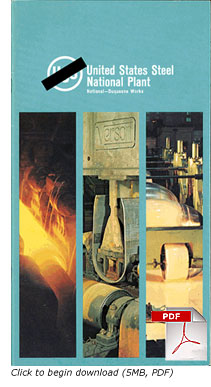National Works, 1970
 |
(The following information about National Works was distributed by U.S. Steel Corp. during a 1970 plant open house.)
A History of National Plant
In 1865 two brothers, John H. and Harvey K. Flagler, formed an iron merchandising company in East Boston, Mass., specializing in the sale of iron boiler tubes. By 1868 they began producing their products.
After careful study of the iron market the Flagler Company decided to relocate in the Pittsburgh district which was becoming the center of a rapidly growing iron and steel industry in America.
In 1870 they purchased the partially rebuilt works of the Fulton-Bolman Company in McKeesport, Pa., and shortly became incorporated as “National Tube Works.”
Adjacent to, and about a quarter mile down river was a National Rolling Mills which produced skelp from its iron puddling furnaces. About a half-mile down river from the National Tube Works was located the Monongahela Furnace Company which operated two blast furnaces.
These three plants, and the Boston Iron and Steel Co., plus the Republic Iron Works on Pittsburgh’s Southside were owned by the same financial interests. These five companies were consolidated under the name National Tube Works Company in 1891, and in 1896 organized a United States Seamless Tube Co. as a subsidiary at Christy Park, Pa., near McKeesport.
In 1899 a consolidation of the 13 major tube and pipe producers occurred and were named National Tube Company. This company, on January 12, 1901, acquired its second seamless facility by purchasing the Standard Seamless Tube Co. of Ellwood City, Pa.
On March 1, 1901 National Tube Company became a subsidiary of United States Steel Corporation. National Tube was designated as a division of the corporation in a reorganization of December 1951.
During these periods U. S. Steel had six plants to service and supply the tube and pipe market.
On January l, 1964 the corporation again reorganized into four major operations, one of which was Tubular Operations, at which time a seventh plant, Youngstown Works was added for administrative purposes. On January 1, 1969 Duquesne Plant of Heavy Operations with its steel making facilities and National Plant of Tubular were merged to become National-Duquesne Works.
The plants are on opposite sides of the Monongahela River and approximately 2 to 3 miles apart. From an efficiency standpoint this is a logical merger.
During its century of progress National has shown its leadership to many worthy competitors in the fabrication of tube and pipe for every imaginable need. It has left an indelible trail of innovations and techniques in this industry. Almost all of the threaded joints and inspection techniques used in the American Petroleum Institute’s specifications originated at National Works. Just as proudly, we feel the service we gave our customers has kept them as our friends.
The Area
National Plant is situated at the confluence of the Youghiogheny and Monongahela rivers, approximately 14 miles Southeast of Pittsburgh, Pa.
The first white settler on this site was a Scotsman, David McKee in 1755. He was seeking religious and social freedom. He was given protection at this site and allowed to settle a farm by the Indian queen “Alliquippa” of the Delaware Tribes, known for her leadership, bravery and fairness. She had just previously chosen this site as her permanent encampment area.
David McKee, one of three sons of the settler, 49 years old at the time of his father’s death in October, 1795, was the only one of the three brothers to remain on his father’s land. He planned a town on the site of McKee Ferry, at the confluence of the rivers and named it McKeesport.
McKeesport grew from a settlement to a third class city in less than a century because of the spirit of its people. All types of industry originated here; some flourished, some lasted awhile then died. Iron and steel was one that grew, river and rail transportation another.
One of the major reasons industry thrives in the McKeesport area is because the people who work in these industries settle and raise their families here. It is not a transient worker population. Because it is their home they take pride in helping their industry grow. After their retirement they watch their sons carry on where they left off. Because industry is people as well as machines, it grows and thrives with that basic human motivation and pride.
Disclaimer
"United States Steel" and the USS logo are trademarks of United States Steel Corp. and no claim is made to them by Tube City Online.
This work does not reflect current practices of United States Steel Corp. and is not endorsed or supported by the corporation in any way, shape or form.
This is an historic document about a significant feature in the development of McKeesport, the former National Works, aka National Tube Co.
It is reproduced as an aid to researchers, students and the general public as a way to educate them about the operations of National Works.
It is averred that this document has fallen into the public domain because of non-compliance with U.S. copyright law, including lack of proper notice and failure to comply with manufacturing requirements. (17 USC 104a)
This work was produced before 1978 but was not deposited with the U.S. Copyright Office. Further, it was published before March 1, 1989, but does not bear a copyright notice.
It is further averred that reproduction of this document falls under the "fair use" provisions of 17 USC 107 for the following reasons:
1.) This work is being reproduced for non-profit, educational purposes;
2.) This work was a publicity handout intended for widespread, free distribution;
3.) This work was produced before 1978 and was not copyrighted, nor does it bear the publisher's copyright notice; and
4.) There is no perceived potential value or market for this work.
---
This article is from tubecityonline.com/steel, the Steel Heritage section of Tube City Online, P.O. Box 94, McKeesport, PA 15134.